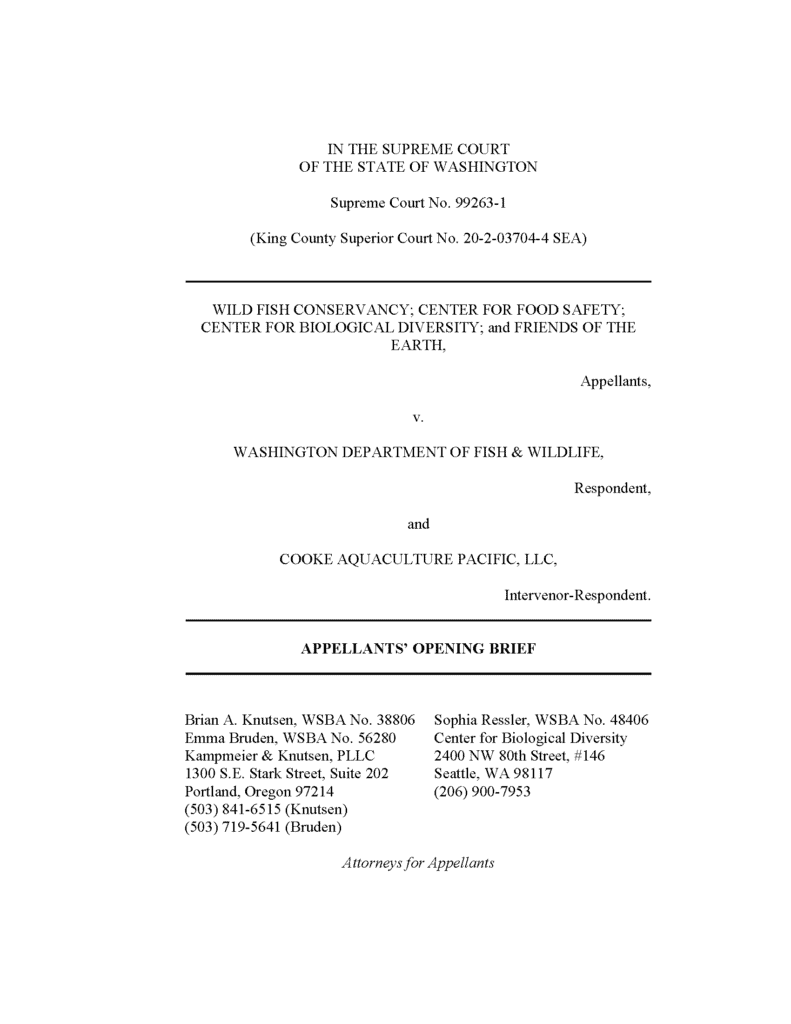
Description |
|---|
Opening brief filed by Wild Fish Conservancy, Center for Biological Diversity, Center for Food Safety, and Friends of the Earth against WA Fish and Wildlife in Washington’s Supreme Court for permitting Cooke Aquaculture to rear domesticated steelhead in their Puget Sound net pens without undergoing the legally required State Environmental Policy Act (SEPA) review of the reasonable and likely environmental impacts. Introduction: The State Environmental Policy Act (“SEPA”) seeks “to inject environmental consciousness into governmental decision-making” to protect the “fundamental and inalienable right to a healthful environment.” Columbia Riverkeeper v. Port of Vancouver USA, 188 Wn.2d 80, 91–92, 392 P.3d 1025 (2017); RCW 43.21C.020(3). The “touchstone” for SEPA compliance is whether the “selection and discussion of alternatives fosters informed decision-making and informed public participation.” See Concerned citizens throughout the Pacific Northwest watched in disgust when one of Cooke Aquaculture Pacific, LLC’s (“Cooke”) commercial salmon farms collapsed in 2017, releasing over 200,000 farmed Atlantic salmon and myriad other pollution into Puget Sound. The Legislature, spurred by outraged Washingtonians, enacted a phase-out of non-native finfish aquaculture. DFW responded by hastily permitting the remaining industrial salmon farms in Puget Sound to rear steelhead—a salmonid stock that poses severe threats to this ecosystem, particularly to threatened Puget Sound steelhead. In doing so, DFW disregarded objections from another state agency, five Puget Sound Tribes, numerous environmental and wildlife groups, and thousands of concerned citizens. DFW determined that its new aquaculture permit for commercial farming of steelhead (“Permit”) would not have significant environmental impacts and that SEPA therefore did not require DFW to evaluate and disclose impacts in an EIS. In concluding that the Permit would not have significant impacts, DFW did not compare the environmental conditions that would exist in the absence of the Permit to those that would result under the Permit. Instead, DFW compared impacts from the Permit to a hypothetical environmental baseline where commercial farming of Atlantic salmon would continue in Puget Sound if DFW did not issue the Permit for steelhead. DFW thereby avoided an EIS by fabricating a fictitious baseline that obfuscated the actual ecological impacts that will result from commercial steelhead farming under the Permit. DFW also refused to study and disclose alternatives, pointing to Department of Ecology (“Ecology”) rules applicable to agencies throughout the State that require such analyses only in an EIS. Clerk’s Papers (“CP”) 624–25. That interpretation is inconsistent with the text of SEPA and judicial opinions and regulations interpreting and implementing identical language in the National Environmental Policy Act (“NEPA”).” Download and read the full opening brief by clicking below. |
File Attachment |
|---|
Download |